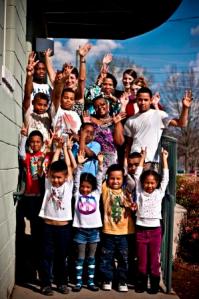Share This
Related Posts
Tags
Passage Home
By Erica Rascón on Mar 14, 2013 in Giving, People
 Passage Home assists the impoverished, the previously incarcerated, and recovery program participants on their path to self-sufficiency through stable housing and life skills training. The North Carolina-based organization faces formidable odds: with unemployment hovering around 35%, nearly 90,000 Wake County residents live in poverty with more than 1,100 facing homelessness. Many of those in need are single-parent households with incomes of less than $10,000. Undaunted, the nonprofit has come up with a plan that would not just mend the problems that the community faces, but rather eradicate the problems from their roots.
Passage Home assists the impoverished, the previously incarcerated, and recovery program participants on their path to self-sufficiency through stable housing and life skills training. The North Carolina-based organization faces formidable odds: with unemployment hovering around 35%, nearly 90,000 Wake County residents live in poverty with more than 1,100 facing homelessness. Many of those in need are single-parent households with incomes of less than $10,000. Undaunted, the nonprofit has come up with a plan that would not just mend the problems that the community faces, but rather eradicate the problems from their roots.
“We believe in empowering people by giving a hand up, not a hand out,” says Karis Lovett Tompkins, Chief Development Officer for Passage Home.
Since its inception in 1991, Passage Home has helped more than 1,000 families pursue autonomy through a series of targeted programing. The organization presents a holistic set of services that aim to empower and enlighten, thus stopping the cycle of poverty. Housing and support services, financial education, youth development, and neighborhood revitalization efforts pull together to create healthy families, healthy homes, and a healthy environment in which residents can thrive.
“The ultimate goal is to have these families in a stable environment,” Karis explains. “Each family is paired with a case manager who can help them where they need it most: job training, parenting, financial literacy—creating and sticking to a budget and improving their credit. We provide a holistic approach to helping families become self-sufficient.”
It is Passage Home’s emphasis on empowering marginalized residents that attracted Karis. The nonprofit furnished her with the career change that she yearned for right when she needed it. “I worked for 12 years selling clinical research software as the head of business development for an organization. It was fine but I needed a change. I ended up leaving my job, traveling for 6 months and doing some mission work. I witnessed poverty first hand like I’d never seen before. It changed me; I wanted to make a big change in my life. I’d always had a passion to help women and children. Passage Homes just sort of found me and pulled me in.”
 Nearly a year later, Karis is fulfilling her passion on a large scale. Almost 90 percent of Passage Home clients are women and children, the latter of which may be the single most important factor in maintaining sustainability.
Nearly a year later, Karis is fulfilling her passion on a large scale. Almost 90 percent of Passage Home clients are women and children, the latter of which may be the single most important factor in maintaining sustainability.
“Children provide an opportunity to break the cycle of poverty. By working with youth, we are creating a pathway for them to succeed, to do well in school, to graduate—they may be the first members of their family to graduate—to go to college and launch a career.”
Passage Home assists children in numerous ways. One of the most common venues is the Kid’s Café After School Program which offers tutoring, computer lab training, mentoring, recreational activities and a hot meal each weekday. 75 percent of students enrolled in the program have shown improvement in math, reading and writing.
During the summer, students ages 5- 12 can take advantage of camps that host activities, field trips and sports. Counselors in Training (CIT) is the summer program for older students. There, they learn leadership skills that can be put to use at summer camps, at school, and in their community.
The nonprofit looks forward to the development of a few new youth initiatives this year. Passage House paired up with Bayer CropScience and SWOOP to create the Kidz Zone, a community garden where children gain hands-on experience in the sciences such as botany and agricultural studies. A second program, Steering Kids in Learning, Leadership and Service (SKILLS) is also slated to expand this year. Through the program, children are taken on educational field trips to businesses.
“Kids visit corporate entities to meet successful people from diverse backgrounds. They get to learn about careers. They can see their options for the future,” says Karis. SKILLS also works with high school seniors, connecting them with SAT preparation tools and post-secondary education resources. Both services act as a springboard to careers that the seniors dream to pursue. Yardi’s financial contributions support SKILLS program development for the future.
While working with youth fills long term voids that may end the proliferation of poverty, the immediate needs of adult members are not overlooked. Passage Home’s services support adults in their current areas of opportunity. 77 percent of program participants receive educational assistance and vocational services via Workforce Development Job Readiness Classes. Participants obtain guidance in crafting a resume, preparing for interviews, leadership skills, and job coaching. With access to a computer lab, clients can submit job applications online and hone their technical skills.
Adults who need help building their resumes may find work opportunities at Passage Home’s multiple enterprises. The Resale and Thrift Shop furnishes employees with real work experience in addition to job training in a caring and professional environment. Proceeds from sales fund the organization’s programs.
Passage Home is also seeking ways to assist innovative adults.
“We are now looking for ways to help those who have an entrepreneurial spirit, who want to start a business. We have a kitchen at the center; we’re  exploring the idea of opening up a café. This would provide job training for someone interested in the hospitality industry or restaurant business. They could sharpen their customer services skills, time management, handling inventory and large orders, things like that.”
exploring the idea of opening up a café. This would provide job training for someone interested in the hospitality industry or restaurant business. They could sharpen their customer services skills, time management, handling inventory and large orders, things like that.”
There are also plans to begin a community garden for adults. Those who work the land would have the opportunity to sell its produce at local farmers markets. A portion of the revenues would go back to community programing.
The original lifeline of Passage Home, though, rests in housing. Currently, the nonprofit houses 200 families with more developments on the way. The Coleman Street Multifamily Housing Complex is a new, 18,000 square foot community that will offer 18 affordable housing apartments. On site, residents can receive many of the same services offered through Passage Home in other parts of Raleigh: after school educational programs, job training and financial literacy workshops for adults, and neighborhood activities.
In the last year, the nonprofit also added housing services for veterans. To date, 63 veterans and their families have received housing. Two new grants will facilitate the expansion of veteran services including more housing, employment assistance, and counseling.
Each Passage Home community meets the unique needs of a singular demographic. The Coleman Street community provides housing for low income, working families. There are also communities for previously homeless women with children and sober living. Each neighborhood is created by building, remodeling, or renovating existing properties with the help of low-interest loans and grants from local institutions, organizations, and businesses.
“I can’t express the significance of the support that we receive from Yardi and other businesses,” says Karis. “It takes so much to help families lift themselves from poverty and there isn’t just one way to do it. With the help of our contributing partners, we will continue to focus on neighborhood revitalization, economic development, and housing support services that can make individuals and families stronger. Together, we can break the cycle of poverty.”
